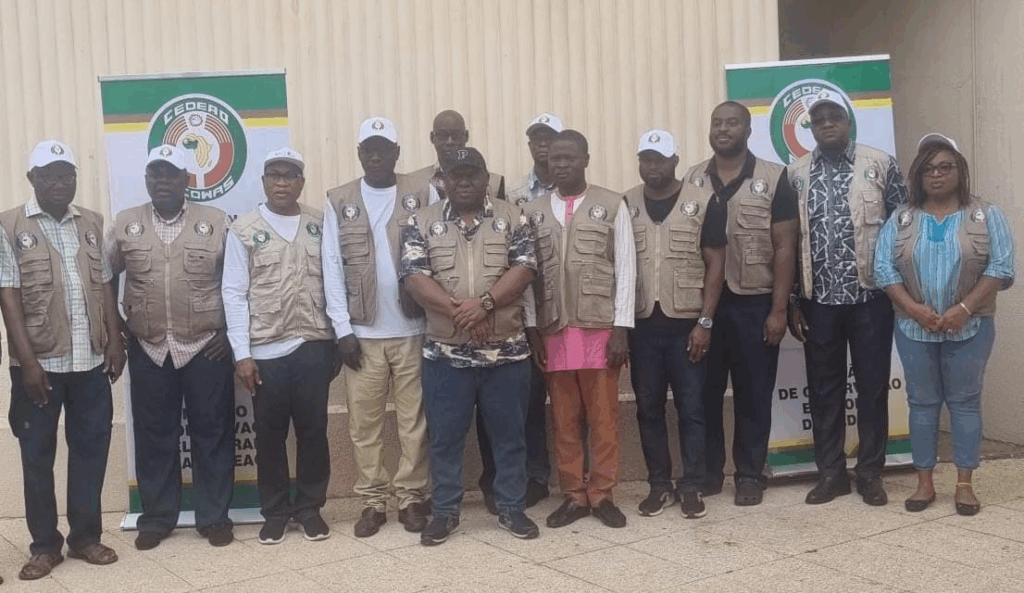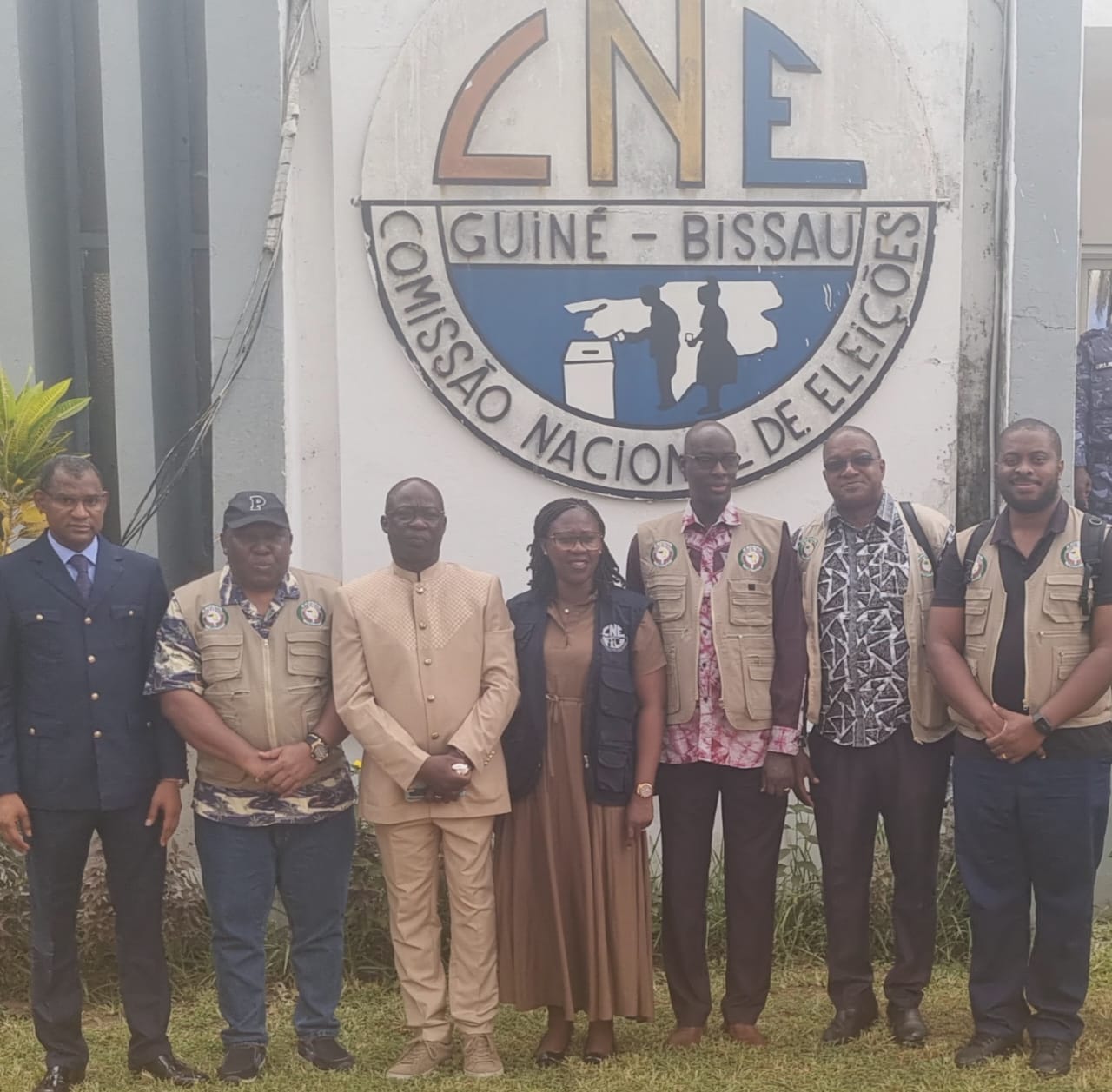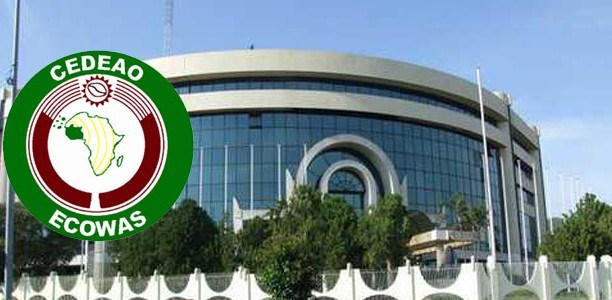PRESS RELEASE
Bissau, Guinea Bissau, 19 November 2025 – Guinea-Bissau’s National Electoral Commission, CNE, has assured the ECOWAS Election Observation Mission (EOM) of its readiness to deliver credible and transparent Presidential and Legislative elections on 23rd November.

CNE Acting Chairman Cabi
Receiving an EOM team at the Commission’s headquarters in Bissau, on Tuesday, 18th November, the acting Chairman, N’pabi Cabi, explained that electoral materials had been dispatched to the eight regions, subdivided into 37 Sectors, including the capital Bissau.
“Everything is ready and the activities are going on according to plan, including the training of election officials,” Cabi said, adding that the Commission had no significant challenges.

Serigne Mamadou Ka, the acting Head of the ECOWAS Electoral Assistance Division within the Directorate of Political Affairs, Peace and Security, who led the ECOWAS delegation, congratulated the CNE for its readiness and reiterated EOM’s determination to execute its mandate with neutrality and professionalism. It is the first time that elections would be held without financial support from development partners since the country’s political independence from Portugal in 1973.

ECOWAS Commission President Dr Omar Touray
The President of the ECOWAS Commission, Dr Omar Alieu Touray, approved the deployment of 120 Medium- and Short-Term Observers for the 23 November elections in Guinea-Bissau in line with the provisions of the regional Supplementary Protocol on Democracy and Good Governance, on support to Member States holding major elections.
The Medium-Term Observers, comprising experts in electoral administration, constitution and legal matters, conflict management, gender, and media, are already holding consultations with stakeholders. They will be joined by their Short-Term colleagues from 19th November.

ECOWAS Medium-Term Observers to Guinea-Bissau 2025
The combined Mission is led by Ambassador Baba Kamara, Ghana’s former High Commissioner to Nigeria with concurrent accreditation to Cameroon, Chad, São Tomé & Príncipe, and ECOWAS (2009-2012).

Ambassador Baba Kamara
A former Senior Presidential Advisor and later National Security Advisor, Kamara is currently the ECOWAS Special Envoy on Counter-terrorism.
The Mission will be supported by a Technical team from the ECOWAS Commission led by Ambassador Abdel-Fatau Musah, Commissioner for Political Affairs, Peace and Security.

Ambassador Abdel-Fatau Musah, ECOWAS Commissioner for Political Affairs, Peace & Security
The CNE has registered 966,152 voters from an estimated population of 2.2 million, who will cast their ballots in 3,728 polling stations nationwide, while voters in the African and European Diaspora will vote at designated centres abroad
Ongoing political campaigns, which started on November 1st, will end on November 22nd, ahead of balloting, officially slated for 7 am to 5 pm on November 23rd.
The electoral Commission has between seven and 10 days to declare the official presidential results, with a candidate required to score 50% +1 vote for an outright win, or the contest goes into a run-off between the two front-runners three weeks after the results of the first round are announced.
The 2025 elections are taking place against the background of political challenges, including two reported military coups that led to the dissolution of the Parliament or People’s National Assembly, ANP, twice in February 2022 and December 2023. There are also lingering disputes over the constitutional roles of the President, the Prime Minister and the Parliament.
A Presidential decree postponed the presidential election from 2024 to November 2025 and also moved the end of the incumbent president’s mandate from February 2025 to September 2025.
The constitution provides for a four-member National Electoral Commission. Still, the three current members are functioning in an acting capacity because the Parliament has yet to approve the appointments of their replacements.
In the 2023 parliamentary vote, the opposition Coalition PAI-Terra Ranka, led by former Prime Minister Domingos Simões Pereira of the African Party for the Independence of Guinea and Cape Verde, PAIGC, won an absolute majority of 54 out of the total 102 seats.
In the December 2019 presidential run-off after an inconclusive first round in November, incumbent President Umaro Sissoco Embaló of Madem G-15 received 53.55% of the votes to defeat Domingos Simões Pereira of PAIGC, who received 46.45%. Pereira challenged the results, alleging irregularities, but the Supreme Court upheld Embaló’s victory in February 2020.
Twelve candidates, all male, have been cleared for the 2025 presidential race, representing political parties, coalitions, and independent candidacies, with President Embaló and former President José Mário Vaz as front-runners.
Following the exclusion of the PAI-Terra Ranka Coalition, including the PAIGC, through a Supreme Court decision, the PAIGC now supports independent candidate Fernando Dias. It is the first time that the PAIGC, which fought for Guinea-Bissau’s independence, will not figure in the country’s major elections.
ECOWAS has a Security and Stabilisation Mission in Guinea-Bissau, ESSMB, and the November elections represent a crucial opportunity for the country to break the cycle of political instability following the dissolution of the Parliament.
A joint High-Level Mission of ECOWAS and the United Nations Office for West Africa and the Sahel (UNOWAS) visited Guinea-Bissau in February 2025 to “support efforts by the political actors and stakeholders towards political consensus on the electoral calendar” and also “establish a consensual framework and modalities for the conduct of legislative and presidential elections.”
![]()








